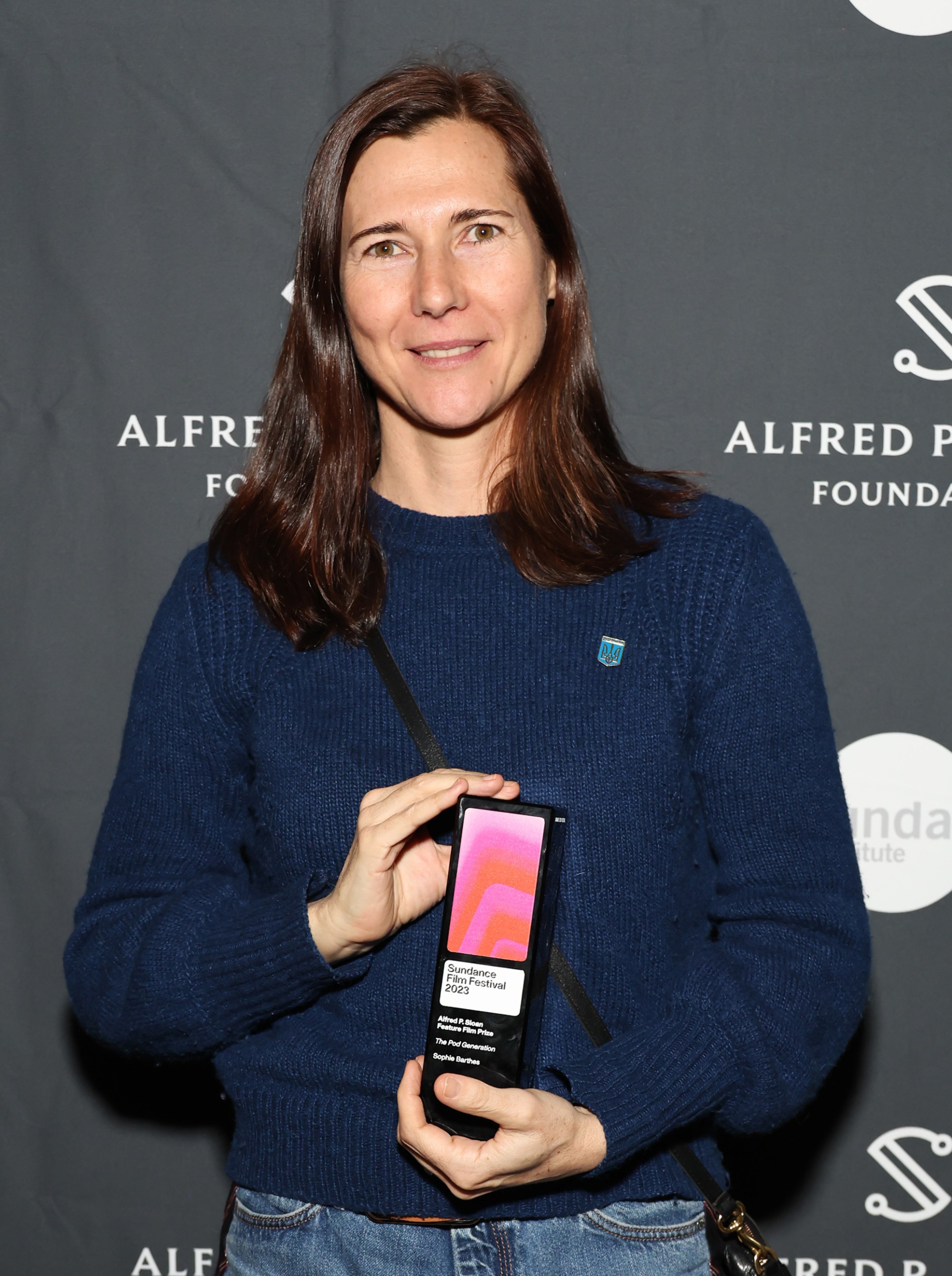
- Interviews
Sundance 2023: Sophie Barthes: “The Pod Generation” Awarded The Alfred P. Sloan Feature Film Prize
First there was natural conception. Then medicine discovered artificial insemination. In time, the choices widened to include parenthood via surrogacy. Now, according to the creative mind of writer/director Sophie Barthes, things are about to get a bit more technologically generated. Welcome to the world of synthetic pregnancy.
The Pod Generation, Barthes’ third feature and the recipient of the Alfred P. Sloan Feature Film Prize at the 2023 edition of the Sundance Film Festival, takes a somewhat satirical look at the concept of detached parenthood. The story centers on a New York couple, Rachel (Emilia Clarke) and Alvy (Chiwetel Ejiofor), who live in a not-so-distant future in which technology provides ever-more convenient living. A rising tech company executive, Rachel lands a coveted spot at the Womb Center, which offers couples a convenient (and shareable) road to parenthood by way of detachable artificial wombs, or pods. But Alvy, a botanist with an affection for nature, prefers a natural pregnancy. And yet, as Rachel’s therapist wonders, why is the old-fashioned way more “natural” than other ways?
Barthes is no stranger to the creative community of Sundance. She premiered her first short at the festival back in 2007, followed by a stint at the Screenwriters Lab. She returned in 2008 with her first feature Cold Souls, starring Paul Giamatti, and now returns with her latest feature film. During the festival, she sat down with the HFPA to talk about her Park City family and the questions her new film raises.
You have such a strong connection to Sundance. How creatively significant has this festival become for you?
It has allowed me to become a filmmaker. First with the short and then with the Lab. It was a family to me and I had so many mentors in the industry giving me notes. They have always welcomed me back and I don’t think I would have been a filmmaker without them. They nurture talent. Once they discover you – and getting into the Lab is gruesome – but once you are there, they are really there for you. It really becomes a family to you.
Science fiction can be such a broad canvas. How did you approach something so unique? Here is a film about pregnancy and technology that, although set in the near future, seems ripped from today’s headlines.
As I was writing the script a few years back, there was some technology I thought I was inventing. As time goes by, it almost became a documentary (laughs). The artificial intelligence (psycho)therapy has now been tested and some students say they actually prefer it to human therapy. They felt less judged by the artificial therapist. So, as I was writing, I felt this was becoming more a documentary than a sci-fi movie. A lot of the technology, such as the artificial womb, has been tested in Israel on mice. They are able to create mice in synthetic wombs. So it will come to us. I see the film more as a surrealistic fable than science fiction in a way. It’s really about raising questions. I don’t provide any answers. I don’t know what our relationship with technology will be in the future. As a filmmaker, I am interested to raise questions about what relationship to we want to have with technology. Do we want to control it or be a slave to the tool?
If this new invention actually comes about, will it level the professional playing field for men and women? Women wouldn’t have to pull back from competing anymore.
That is the whole point of the film. We are asking a controversial question that I don’t have an answer for. What I wanted to explore with the characters is that once this technology is available – and one day it will be available – like all great technological advancements, we are happy when they exist but we don’t anticipate all the questions until after they are invented. And then we have to answer the ethical and philosophical questions. You can see this in two different ways. It can be a liberation for women, because they don’t have to be carrying a baby for nine months and could have full parity with men; or you could see it as women giving up on this extraordinary power which is giving birth. That has for centuries made men a bit envious. Maybe that’s why they needed to control women. They were afraid of this power of women because they had this power of giving birth. So, you can see it both ways.
In your conversations with other women about this, do you find them able to view it objectively?
When you talk to feminists, some are totally pro pod. They think it intimates parity. Other feminists are completely against it because they say if they gave that up as women, they would become redundant. Then they will be even more disparaged by men. They will feel useless. The film is navigating this debate. Is it something desirable or something we should be scared of?
You were born in France, have previously lived in South America and the Middle East, and are now based in New York. How have those different cultural landscapes informed you?
The more you travel! I think every year, you should pick a country you have never been to and go there to help expand your mind. By living with different cultures, you expand your mind. You start to feel that you don’t really belong anywhere and things can get a bit absurd. That is why I like surrealism and absurdism. Latin America had a great surrealistic nature that was very influential to me. I take from all the places. For America, I love all the possibilities but it is a place where every day, I feel the science fiction journey (laughs).

